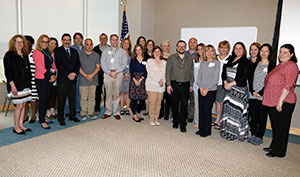College to celebrate first ACUE 'Effective Teaching Practices' cohort
April 15, 2019
The Community College of Rhode Island has partnered with the Association of College and University Educators to offer a voluntary course allowing faculty members to learn valuable new techniques.
 The college will celebrate the first cohort of 19 faculty members to complete ACUE’s
“Effective Teaching Practices” program on at 10 a.m. on Friday, April 19, in Room
4090 at the Knight Campus in Warwick.
The college will celebrate the first cohort of 19 faculty members to complete ACUE’s
“Effective Teaching Practices” program on at 10 a.m. on Friday, April 19, in Room
4090 at the Knight Campus in Warwick.
The yearlong course broken up into 28 separate modules, covering a wide range of practical teaching topics such as preparing an effective syllabus, delivering a powerful lecture, connecting with students and embracing diversity in the classroom.
The only institution in the state to offer the program to its faculty, CCRI will launch its second cohort of up to 30 faculty members later this month. Newly participating faculty are encouraged to preview the material and can begin working on modules over the summer in anticipation of the 2019 fall semester.
Founded on evidence-based approaches from experts in the educational field, ACUE’s mission is to improve student engagement and ensure success in the classroom through quality instruction.
“Professional development is an important part of the strategic plan. It’s an investment we want to make in our faculty,” said Karen Bellnier, CCRI’s director of instructional technology and online learning. “Participating in the course validates the successful practices used by many of our faculty and adds new techniques to their skill set.”
Endorsed by the American Council on Education, ACUE’s “Effective Teaching Practices” program is the equivalent of a three-credit graduate-level course and allows professors who participate to work at their own pace while still maintaining a structured workflow.
To finish a module and move on to the next, professors must apply the lesson in their classroom and complete a reflection based on their experience with students. Bellnier said this makes the ACUE course potentially more effective for professors than traditional conferences or workshops.
“This approach is really pragmatic,” she said. “You have to use it. It really gives you a chance, in the moment, to hear about it, go try it and say, ‘Yes, this worked,’ or, ‘This didn’t work for me.’”
Bellnier said she received positive feedback from CCRI’s first cohort.
Assistant Professor Matthew Ulricksen, who teaches social sciences, said the program helped him in three ways.
“One, it made me realize I’m doing a lot of things right to begin with. It was affirmational. Secondly, it showed me even though I’m doing a lot of those things right, it showed me how much better I could be teaching and improving the learning experience for my students. Then it gave me an appreciation for what my distance learning students experience in taking a distance learning class. I found that hands-on experience in that regard to be valuable.”
In addition to the evaluations at the end of each module, faculty members complete a brief, informal action plan once they finish the curriculum, allowing them to highlight which modules were most effective or relevant in their classroom.
Leslie Dolan, assistant professor of English and Accelerated Learning Program coordinator, said the program introduced new techniques. “I would introduce them subtly into my classes and lessons. One module talked about closing strong at the end of a class and taking time to summarize what was covered. It worked out well and allowed me to make sure the students understood the major components of that lesson. It also allowed them to confirm what they learned.
“I’ve always been a firm believer in innovation. This, for me, was just another way to continue what I do while learning new material and sharing information,” Dolan said.
“It’s our job to help students be successful, and investing in our faculty is the way to do that,” Bellnier said.